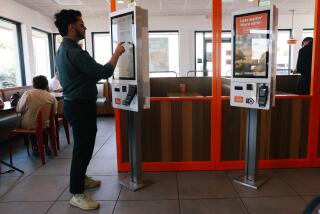Smart Routing Could Be Boon for Active Investor
- Share via
Smart order-routing technology isn’t for everyone. But for heavy-duty online investors, it may offer distinct benefits over trading stocks through mainstream online brokerages.
The day-trading firms behind the technology--which automatically sends buy and sell orders to whichever trading venue has the best price at any moment--pitch their systems as securing slightly better prices for investors on a good portion of their trades.
Buying at $20.13 a share instead of $20.19 probably doesn’t matter much to a long-term investor who holds stocks for several months or years.
Smart order-routing is “not [for] the novice, not [for] the hobbyist,” said Bobby Earthman, president of TradeCast Securities.
But to an active investor who trades at least several times a week and often holds shares for far shorter periods, it can make a big difference in net trading profits.
“The trader can focus on trading while the technology is designed to seek the best price and the fastest execution,” said Philip Berber, chief executive of CyBerCorp.com’s parent company.
CyBerCorp.com (https://www.cybercorp.com) already offers smart order-routing technology to individuals. Two other firms--Tradescape.com (https://www.tradescape.com) and TradeCast Securities (https://www.tradecast.com)--plan to offer such services in January.
*
In general, it’s currently more expensive to trade through the smart order-routing systems than through traditional online brokers such as Charles Schwab or E-Trade.
For example, TradeCast’s smart-order technology is offered through its Revolution brokerage account. Commissions are $19.95 per trade, lower than the $29.95 charged by Schwab.
But real-time streaming quotes--a key tool for active investors--cost $36.50 a month. And a more advanced package containing so-called Level II quotes is $100 a month.
Level II quotes show in real time the bid and asked prices available at any moment from Wall Street market makers, as well as prices offered by investors trading directly on competing electronic communications networks, or ECNs.
At Tradescape.com, pricing for its smart order-routing service has not been finalized, said Omar Kathwari, the firm’s director of Internet technology. But as it stands now, the firm would charge $1.50 commission for each 100 shares. A 500-share trade thus would cost $7.50 in commissions.
But that doesn’t include per-trade charges assessed by individual ECNs, which can run from free to about $7.50 per trade.
In addition, Tradescape would charge investors between $50 and $80 a month to cover fees assessed by the New York Stock Exchange and Nasdaq. Those fees would likely be waived for customers with larger balances or those doing a minimum number of monthly trades, Kathwari said.
*
The key for the day-trading firms in selling smart order-routing systems is in convincing customers that they will save more by getting better executions, trade after trade, than they will pay in various additional system charges.
“We’re offering the best possible executions at the lowest possible cost,” said Omar Amanat, Tradescape.com chief executive.
But even for active investors, there are times when smart order-routing technology will be very useful--and other times when it isn’t critical.
The system should make the most difference in securing better prices at the open and close of the market each day, Kathwari said. That’s when volume is the heaviest, and during those periods stock prices often experience their greatest volatility. There can be significant price differences for the same stock among different trading venues.
“When you’re talking about 9:30 to 10 [Eastern time] and 3 to 4, that’s when a system like this is really going to shine,” Kathwari said. “At 12 o’clock, the advantage is going to be negligible.”
Some analysts say smart order-routing technology may prove surprisingly popular among individual investors, even at current costs.
“I think the prospects are enormous,” said Greg Smith, an analyst at Hambrecht & Quist in San Francisco. “It runs the gamut from retail to institutional, and [from] sophisticated investors to unsophisticated.”
As individuals become more knowledgeable about trading issues, traditional online brokerages also are likely to start offering smart order-routing, experts say.
“The ability to be able to electronically route or work orders will be mainstream within a few years,” Smith said.
More to Read
Inside the business of entertainment
The Wide Shot brings you news, analysis and insights on everything from streaming wars to production — and what it all means for the future.
You may occasionally receive promotional content from the Los Angeles Times.










